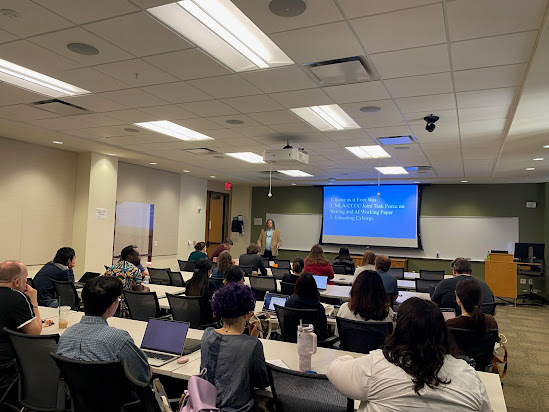"AI is not going to take your job. People who know how to use AI are going to take your job." - An Interview With Adobe Digital Thought Leader, Dr. Sidney I. Dobrin
The University of Florida’s Dr. Sidney I. Dobrin recently visited Texas A&M University, where he spoke on GenTech’s future in relation to higher education programs and the environment.
“I’ve been working with emerging technologies pretty much my whole career,” says Dobrin, who initially became interested in artificial intelligence when he was in high school. He studies digital and environmental humanities, specifically focusing on the relationship between AI and writing, ocean conservation, and environmental conservation.
“It’s not that people lost their jobs, it’s (that) they had to adjust their jobs toward a more productive, more beneficial approach to automotive making.”
These questions rely heavily on the fact that the use of artificial intelligence, virtual reality, and other emerging technologies is growing exponentially. Dobrin explains how “AI is becoming very prominent in a lot of different industries,” which is concerning to some. However, he emphasizes that “AI is not going to take your job. People who know how to use AI are going to take your job.” He continues, stating that “we had this same argument in the 1970s … about whether robotics were going to take over the automotive industry. … What happened is the robotic intervention … created a new kind of human machine collaboration, which made more efficient the companies, which made more efficient the production of automobiles. … It’s not that people lost their jobs, it’s (that) they had to adjust their jobs toward a more productive, more beneficial approach to automotive making.
 |
| Dr. Dobrin presenting at Texas A&M |
“Last month, they fired twelve writers and hired one person who knows prompt engineering well enough to write stories via AI very quickly.”
In today’s job market, we can see similar trends, which revolve around the importance of efficiency. Dobrin reports that “[he has] a friend who works in a big PR agency. … Last month, they fired twelve writers and hired one person who knows prompt engineering well enough to write stories via AI very quickly.” This example is one of many that stress the importance of students growing their knowledge of these emerging technologies. Dobrin suggests that “as [students] start to consider what area [they] want to work in,” they should begin studying “how AI is already being integrated into those areas.”
“[no student] is using [AI] the way the faculty thinks [they are].”
With this in mind, Dobrin states that “[no student] is using [AI] the way the faculty thinks [they are] in terms of, ‘write an essay about Moby-Dick.’ Instead, they’re using it for idea generation, for getting feedback on what they’ve written, (and) for taking smaller segments and having things fine tuned. … The fact of the matter is (that) ChatGPT is such a basic output, and most of us don’t know (enough about) prompt writing to where it would be able to provide enough details in the prompt to get an output that’s going to serve [the] purpose.” Dobrin adds that “[he thinks] faculty - those who are designing the curricula - need to start integrating assignments, (and) recreating assignments, that teach students how to use AI … (in terms of), ‘here’s what I want you to do with GenAI in the assignment to get to this point.’”
 |
| Dr. Dobrin presenting at Texas A&M |
“We’ve created this kind of weird user rhetoric, ‘users are losers.’”
“When [he does] student workshops, [Dobrin] always [finds] it interesting when [he says], ‘okay, how many of you have used ChatGPT?’ … [The students] all look around to see who’s going to be the first person to fess up about it. … We’ve created this kind of weird user rhetoric, ‘users are losers.’ … We need to be upfront and transparent. ‘Yeah, I’m a user, and here’s what I’m doing, and here’s what I’m accomplishing with this.’”
According to Dobrin, this transparency, along with documentation, is crucial. “Be upfront with how you’re using [it], and document how you’re using it - and that’s for students and faculty both.”



Comments
Post a Comment